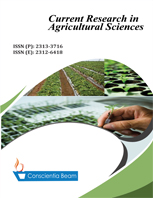Towards Achieving Food Security in Nigeria: A Fuzzy Comprehensive Assessment of Heavy Metals Contamination in Organic Fertilizers
DOI:
https://doi.org/10.18488/journal.68.2021.82.110.127Abstract
In the quest towards achieving the Zero hunger agenda of the sustainable development goals by 2030, the utilization of organic fertilizers, for soil amendment purposes, has been posited as a feasible alternative for overcoming the negative impacts of inorganic fertilizers. Despite its manifold benefits, the use of untreated and improperly treated organic materials in agricultural production is however capable of introducing toxic metals in the soil-plant systems causing health and agro-environmental impacts. In this study, available organic fertilizers use by Nigerian farmers were selected and analyzed for nutrient values and most importantly, heavy metal contamination. The degree of contamination in each sample was modeled using fuzzy comprehensive assessment. The manure samples possessed optimum nutritional values; the nitrogen, phosphate, and potash contents ranged from 0.91 – 7.44, 0.06 – 1.61, 0.14 – 0.58% respectively. The fuzzy algorithm results categorized all the organic fertilizers as pristine, with a membership degree ranging from 35 to 99%. However, an excessive level of toxic contamination, with a membership function between 3 to 33% was observed. The major contaminants were identified as Zn, Cr, and Cd with an individual contribution of 16, 29, and 33% respectively. Adequate remediation techniques and good management practices that reduce the concentration of heavy metals in the organic fertilizers especially that of Zn, Cr, and Cd, should therefore be promoted among the producers and users of these soil improvers in Nigeria.

